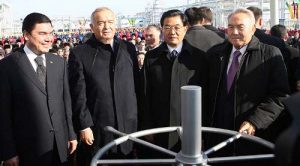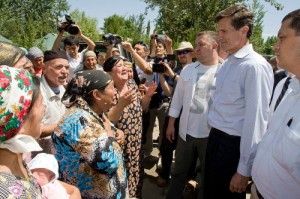
Presidents of China, Kazakhstan, Uzbekistan and Turkmenistan attend the opening of the new Turkmenistan-China gas pipeline, Turkmenabat, Turkmenistan, on December 14 2009 (http://www.akorda.kz)
China is keen on enhancing its economic cooperation with Central Asia, which is regarded by many as the best way to address its present-day economic needs. In December 2009 Hu Jintao met with the presidents of Uzbekistan and Turkmenistan at the inauguration ceremony of the Central Asia-China gas pipeline and stated a warming relationship between them.[39] The Chinese policy towards Central Asia is every bit similar to its political strategy for Africa, namely for Sudan, which is one of the major trade partners of the Middle Kingdom on the African continent. As long as China is allowed to drill on the Sudanese soil, it will pledge its support to the government in place in Khartoum and turn a blind eye to the Darfur humanitarian catastrophe.[40] As long as the Chinese interests in Central Asia are met, it will continue to play by the known rules.
China has long confined itself to an idle onlooker’s position, as the world around continues to change. Its political clout in world affairs seems to be illusory, as China has always been too cautious to proceed with the outright pursuit of its hidden agenda. Unless China feels ready to speak up, breaking with the centuries-old tradition, it will remain an onlooker whose voice may have been heard at so many occasions, but actually wasn’t, as it feared reciprocal steps from those it could have slashed and ridiculed. Central Asia has become China’s economic stronghold and a reliable source of energy supplies badly needed by the ever growing Chinese economy. But the Chinese pawns are too shy to cross the midline separating the two parts of the Grand Chessboard, and would rather prefer to refurbish their own land than to challenge somebody else’s ambitions in an open slugfest, risking losing what they have done the hard way so far.
The United States of America
The US, the one-time herald of a new approach to international relations parting with both isolationism and Wilsonian idealism, has been one of the most proactive players in the Central Asian region since its opening to the world in the early 1990s. Having won the Cold war and sapped its sworn enemy’s vital forces by means of a relentless arms race, the United States became the strongest and most influential country on the globe, whose geopolitical capabilities only strengthened with a successful anti-Iraq campaign for the defense of Kuwait extended half a world eastward. Despite the objective remoteness of America from the Eurasian heartland, the US leadership found the moment appropriate to interfere with this part of the world, where the American presence had been traditionally low and influence paltry. In 1993, at the meeting of NATO defense ministers in Germany, American delegates proposed a trust building program for Eastern Europe and former Soviet republics, including all the five countries of Central Asia, which came to be known as Partnership for Peace.[41] This program was a perfect tool for the US, collectively represented by NATO, to spread its influence over the region which had been just recently rotating around the Russian orbit. The prospect of an American intrusion into the so-called Russian backyard grated many hard-headed Russian politicians back in Moscow and made them think of a renewed Cold war, which would be now a war for influence and semi-political control. Speaking in March 1999 before the Subcommittee on Asia and the Pacific of the US House of Representatives, Ariel Cohen, Ph.D., member of the Council of foreign relations and the London-based International Institute of Strategic Studies, thus defined the most salient challenges faced by Central Asia:
Russia would like to prevent the NIS from exporting energy resources to deny these [Central Asian] countries the cash flows needed to build independence….Both the West and the governments of the NIS, he goes on, have a common interest in warding off Russian attempts to impose hegemony by playing an irresponsible role in promoting ethnic conflicts, or preventing their speedy and peaceful resolution.[42]
He also warned of a possible interference on behalf of Iran in Central Asian politics and proposed his own vision of how America should cope with it.
It is in the interest of America and the West to deny Iran markets, revenues and freedom of maneuver in Central Asia until such time as it abandons its anti-American and anti-Western position.

US Assistant Secretary of State Robert Blake meets ethnic Uzbeks, who fled southern Kyrgyzstan, on the Uzbek-Kyrgyz border on June 18 2010 (Reuters/Shamil Zhumatov)
In his testimony before the US House of Representatives, Ariel Cohen outlined the desired course to be followed by the United States to preclude any attempts of pushing America out of the region.
The challenge for US policy in the next century is to keep conquerors away from Central Asia and to foster regional cooperation between the states, as well as between the regional players: Russia, Iran, Turkey, China, India and Pakistan.
Finally, the author of more than 500 articles and 25 book chapters drew the attention of his listeners to the fact that through the support of Pakistan which was bargaining at the time with the Taliban in Kabul to get control of the strategic depth into Afghanistan,[43] the United States’ position in Central Asia was imperiled by a shadow of alienation of its newly acquired allies. “Politically and morally, America cannot afford to be associated with a medieval fundamentalist Islamic movement which commits the worst human rights abuses and is supporting itself through drug trafficking” was Ariel Cohen’s weighed conclusion.
In 2001 the United States, backed up by British troops, invaded Afghanistan and toppled the Taliban regime there.[44] In 2003 it invaded Iraq in order to, as President George W. Bush said, “disarm Iraq of weapons of mass destruction, to end Saddam Hussein’s support for terrorism, and to free the Iraqi people”.[45] In 2007 the Bush Administration fell out with Moscow on the issue of the American missile defense installations to be set up in Poland and the Czech Republic.[46] The same year, Russian President Vladimir Putin, speaking at the annual Munich Conference on Security Policy, slashed the United States for its expansionist behavior and breach of trust, referring, inter alia, to the US withdrawal in 2002 from the ABM Treaty signed in 1972.[47] The US-Russian relations started to quickly deteriorate, and this tension was only aggravated by the Russian-Georgian conflict of 2008.[48] Earlier that year, the autonomous region of Kosovo within the state of Serbia proclaimed its full independence from Belgrade and mustered frank support from the US, despite Russia’s vigorous protests.[49] Another apple of discord has been the case of Ukraine, which has been balancing between the West and the East from the very date of its sovereignty. Under the Bush Administration, American support to anti-Russian President Viktor Yushchenko, leader of the 2004 Orange Revolution, was unequivocal and quite unsettling in the eyes of the Kremlin. Less distinct, but as disturbing tensions exist between Washington and Beijing which have had some grueling experience over the issues of Taiwan, Tibet and Chinese monetary policies.[50] It would not be pointless to note that even Europe, which has stood by the US at the most decisive moments of the American and world history, is somewhat divided over the level of support to America whenever it is about to interfere in the natural course of events.[51]







